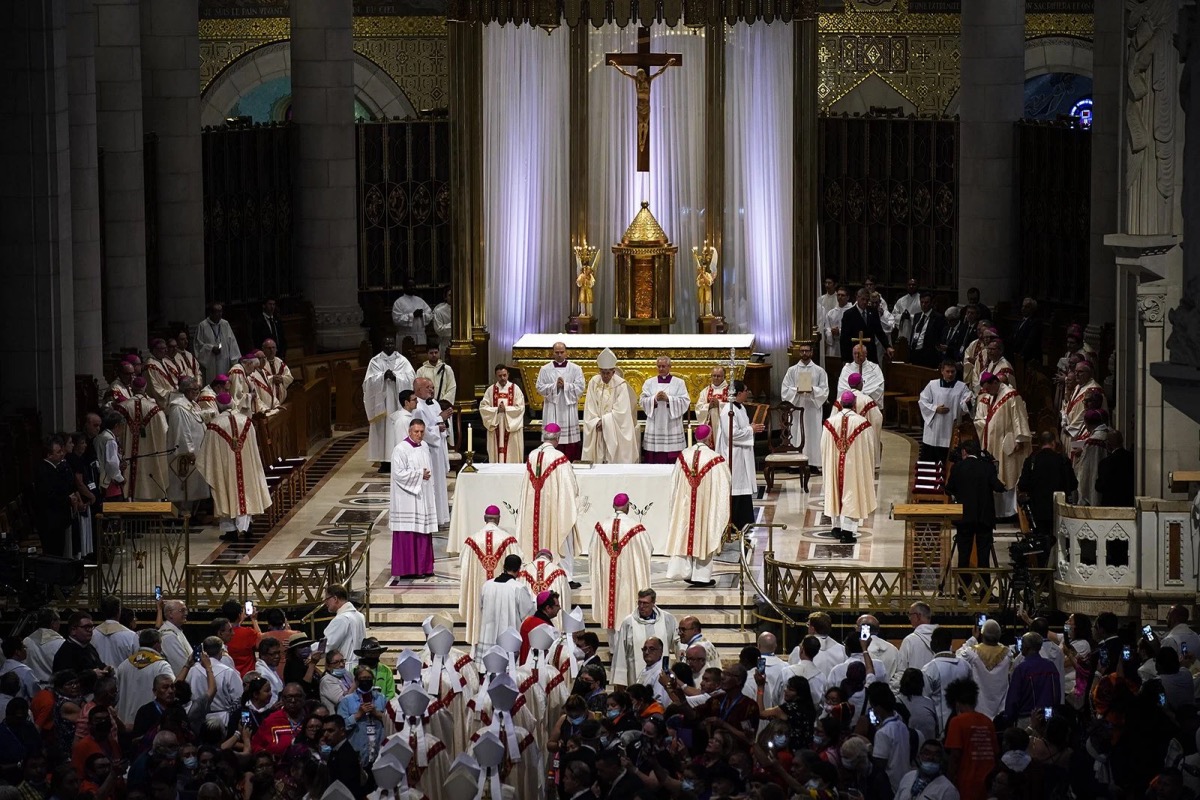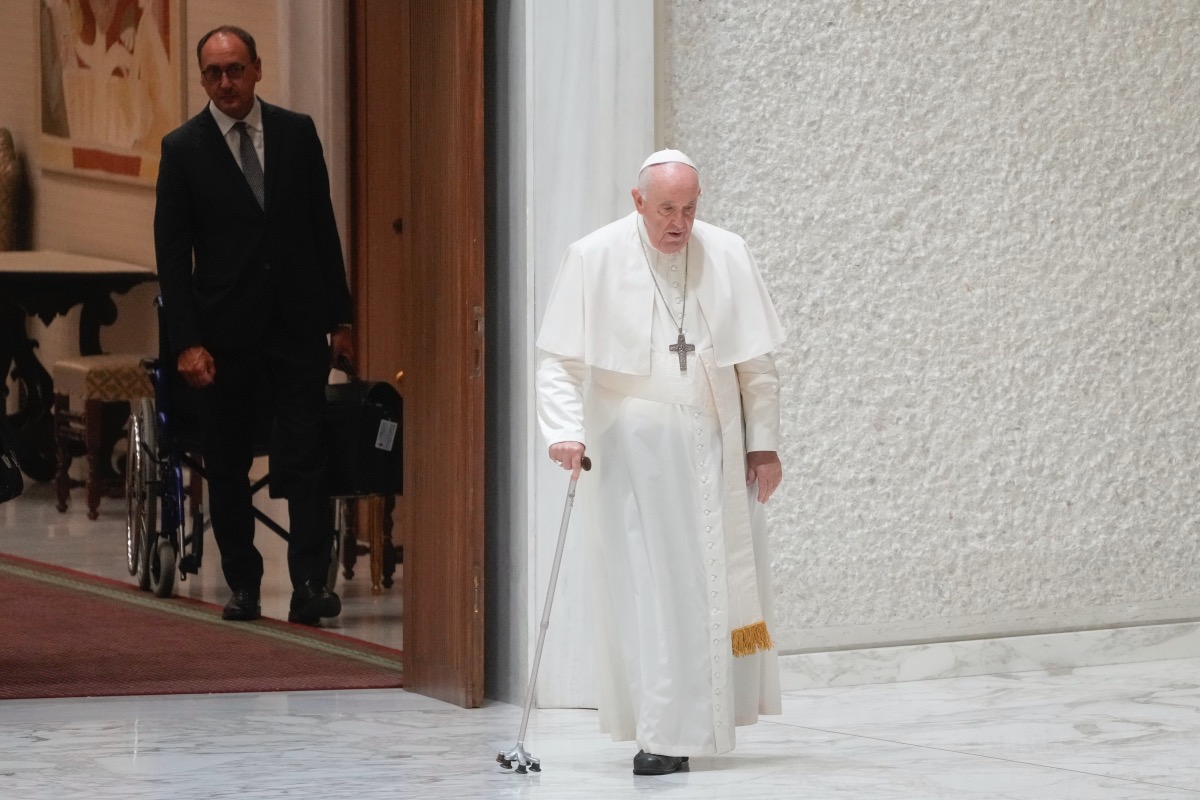Vatican City
RNS
On the last day of his apostolic visit to Canada, Pope Francis spoke to a group of Jesuit priests and emphasised the importance of unity among bishops and in the entire church, even as divisions over liturgy and doctrine continued to plague his papacy.
A transcript of the Pope’s meeting Friday with 15 Jesuits in Quebec City was published Thursday by La Civiltà Cattolica, a Jesuit magazine. In a lengthy conversation, the Pope answered questions about his vision for a synodal church, the development of church doctrine and reconciliation with the Indigenous peoples of Canada.

Pope Francis presides over a Mass at the National Shrine of St Anne de Beaupre, on 28th July, in St Anne de Beaupre, Quebec. Pope Francis paid a “penitential” six-day visit to Canada recently to beg forgiveness from survivors of the country’s residential schools, where Catholic missionaries contributed to the “cultural genocide” of generations of Indigenous children by trying to stamp out their languages, cultures and traditions. PICTURE: AP Photo/John Locher.
The Pope, who went to Canada at the request of Canadian Prime Minister Justin Trudeau and the Canadian Catholic bishops to address the mistreatment of Indigenous people in Catholic-run residential schools, apologised on behalf of the church for the wrongs of the past. In his discussion with the Jesuit priests, he praised the role that the Canadian bishops have played in paving the road toward reconciliation.
Francis said that his visit was “just the icing on the cake” and that it was “the bishops who have done everything with their unity”.
POPE PROMOTES VATICAN NURSE CREDITED WITH SAVING HIS LIFE
Pope Francis has promoted a Vatican nurse whom he credited with saving his life to be his “personal health care assistant.”
The Vatican announced the appointment of Massimiliano Strappetti in a one-line statement issued Thursday. Strappetti, the nursing coordinator of the Vatican’s health department, accompanied Francis on a difficult trip to Canada last month.

Massimiliano Strappetti, left, watches Pope Francis walking in the Paul VI hall on the occasion of the weekly general audience at the Vatican, Wednesday, 3rd August. PICTURE: AP Photo/Gregorio Borgia.
Francis, 85, last year credited Strappetti with having accurately ascertained an intestinal problem that led to the Pope’s 10-day hospital stay in July, 2021, to remove 33 centimetres of his colon that had narrowed.
“A nurse, a man with a lot of experience, saved my life,” Francis told the COPE radio of the Spanish bishops’ conference in the months after his surgery.
Francis noted that Strappetti’s intervention was the second time a nurse had saved his life. A nurse in his native Argentina decided in 1957 to double the amount of drugs the future pope, then known as Jorge Mario Bergoglio, was prescribed after part of his lung was removed due to a respiratory infection, he recalled.
Francis has a personal physician, Dr Roberto Bernabei, who was appointed last year. Bernabei is an internist and geriatric specialist at the Catholic University of the Sacred Heart in Rome.
The pontiff has had a series of health problems in the past year, most significantly strained ligaments in his right knee that sharply reduced his mobility. After months of magnetic and laser treatments, Francis can walk short distances with a cane or walker, though he also uses a wheelchair.
Strappetti was on hand to help with the wheelchair during Francis’ general audience Wednesday. He coordinates the nurses of the Vatican’s small healthcare system, which provides basic care for Vatican employees and their families.
Strappetti’s appointment was announced days after he and a doctor accompanied Francis on his weeklong “penitential pilgrimage” to Canada to atone for the Catholic Church’s role in the country’s residential schools for Indigenous children. Francis always travels with a doctor and nurse who are on call in case he has health problems. Strappetti, for example, was on hand when Francis issued his main apology and received a feathered headdress from Indigenous leaders.
On the flight home from the trip, Francis said he would have to slow down his future travels and maybe resign one day.
“This trip was a bit of a test. It’s true you can’t do trips in this state, maybe we have to change a bit the style, reduce, pay the debts of the trips that I still have to do and reorganise,” he said. But he added that “the door is open” to also resign if he can’t carry on.
– Rome, Italy/AP
“When an episcopate is united,” he said, ” it can deal with the challenges that arise.” By contrast, the Pope said, ideology is “the worst enemy against the unity of the church and of the episcopates.”
Francis also addressed lingering questions from the Canada trip, including whether his apology came on behalf of the entire church.
“I do not speak for myself or for an ideology or a party. I am a bishop and I speak in the name of the church, not in my own name,” he said, stressing that his apology was for the church as an institution.
Asked why he did not meet with sexual abuse survivors while in the country, Francis said he didn’t want to detract from the message of reconciliation with Indigenous peoples and that, anyway, the trip’s packed schedule made personal meetings impossible. But he said he had answered the survivors’ letters.
“Many people responded to me saying that they understood that this was not an exclusion at all,” he said.
But clashes over church doctrine that have cropped up with increasing frequency in the Pope’s tenure were unavoidable. “Changes needed to be made, and they were made,” he told the Jesuit priests. “Law cannot be kept in a refrigerator. Law accompanies life and life goes on. Like morals, it is being perfected.”
Francis pointed to how morality and doctrine have developed in time with regard to slavery and the possession of nuclear weapons. He objected to the view that “the doctrine of the church is monolithic” while praising the importance of defending “authentic” tradition.
“We must take the origin as a reference, not a particular historical experience taken as a perpetual model, as if we had to stop there,” he said, comparing the attitude of “it has always been that way” to “paganism of thought.”
His comments were similar to those aboard the papal plane returning from Canada, when the Pope answered a question about birth control, which Catholic doctrine considers “intrinsically evil.” The Pope said that while the evolution of doctrine “is a good thing,” it must occur within the church and in line with tradition.
Among the several changes that Francis has brought to the church is the near total ban on the saying of the pre-Vatican II Latin Mass, which had been liberalized by his predecessor, Pope Benedict XVI. “The most recent verification made it clear that there was a need to regulate the practice, and above all to avoid it becoming a matter, let us say, of ‘fashion,’ and remaining instead a pastoral question,” the Pope told the Jesuits.
Francis recalled the “monstrous liturgical deformations” espoused by the left during the 1960s and ’80s in his native Latin America, and the “backward looking intoxication” of conservative Catholics.
“When there is conflict, the liturgy is always mistreated,” he said.
The Pope spoke about his upcoming summit of bishops at the Vatican on synodality – Francis’ vision of a more horizontal, inclusive church that encourages the participation of laypeople.
“It bothers me that the adjective ‘synodal’ is used as if it were the latest quick fix for the church,” he said.
Francis made clear that synodality “is not focused on a vote, nor is it a dialectical confrontation between a majority and a minority.” Unlike a democracy or a parliament, the protagonist of a synod is the Holy Spirit, he added, while rejecting efforts to “squeeze it all into the funnel of a single issue.”





